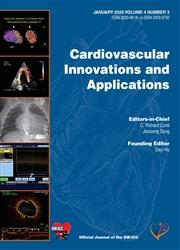Integration Analysis of Epigenetic-related m6A-SNPs Associated with Atrial Fibrillation
IF 1.4
4区 医学
Q4 CARDIAC & CARDIOVASCULAR SYSTEMS
引用次数: 1
Abstract
Objective: Numerous single nucleotide polymorphisms (SNPs) have been identified as genetic contributors to atrial fibrillation (AF). The aim of this study was to investigate the effects of genome-wide N6-methyladenosine (m6A)-SNPs on AF. Method: m6A-SNPs were identified by analysis of raw data from published AF GWAS datasets and the list of m6A-SNPs from the m6AVar database. Expression quantitative trait loci (eQTL) analysis was conducted to evaluate the effects of m6A-SNPs on gene expression. The expression of linked genes was validated in three independent AF-associated gene expression datasets (GSE14975, GSE108660 and GSE2240). Results: A total of 1429 (6.2%) unique m6A-SNPs that were significantly associated with AF were identified. Seventeen m6A-SNPs in 14 genes reached genome-wide significance. Eight m6A-SNPs demonstrated eQTL signals. Four m6A-SNPs (rs383692, rs3211105, rs1061259 and rs1152582) exhibited strong cis-eQTL signals associated with the gene expression levels of SMIM8, JMJD1C and SYNE2. SYNE2 and SMIM8 had differential gene expression levels between the AF and sinus rhythm groups. In addition, SYNE2 expression was uniformly downregulated in AF samples compared with normal control samples in the three datasets. Conclusions: Our results provide the first demonstration that m6A-SNPs are strongly associated with AF, and extend understanding of m6A modification as a potential biological pathway underlying AF.心房颤动相关表观遗传相关m6a - snp的整合分析
目的:许多单核苷酸多态性(snp)已被确定为心房颤动(AF)的遗传因素。本研究旨在探讨全基因组n6 -甲基腺苷(m6A)-SNPs对AF的影响。方法:通过分析已发表的AF GWAS数据库的原始数据和m6AVar数据库中的m6A-SNPs列表,对m6A-SNPs进行鉴定。通过表达数量性状位点(eQTL)分析m6A-SNPs对基因表达的影响。在三个独立的af相关基因表达数据集(GSE14975、GSE108660和GSE2240)中验证了相关基因的表达。结果:共鉴定出1429个(6.2%)与房颤显著相关的独特m6a - snp。14个基因中的17个m6A-SNPs达到全基因组意义。8个m6a - snp显示了eQTL信号。4个m6a - snp (rs383692、rs3211105、rs1061259和rs1152582)表现出与SMIM8、JMJD1C和SYNE2基因表达水平相关的强顺式eqtl信号。SYNE2和SMIM8基因表达水平在房颤组和窦性心律组之间存在差异。此外,在三个数据集中,与正常对照样本相比,AF样本中SYNE2的表达均下调。结论:我们的研究结果首次证明了m6A- snp与房颤密切相关,并扩展了对m6A修饰作为房颤潜在生物学途径的理解。
本文章由计算机程序翻译,如有差异,请以英文原文为准。
求助全文
约1分钟内获得全文
求助全文
来源期刊

Cardiovascular Innovations and Applications
CARDIAC & CARDIOVASCULAR SYSTEMS-
CiteScore
0.80
自引率
20.00%
发文量
222
 求助内容:
求助内容: 应助结果提醒方式:
应助结果提醒方式:


